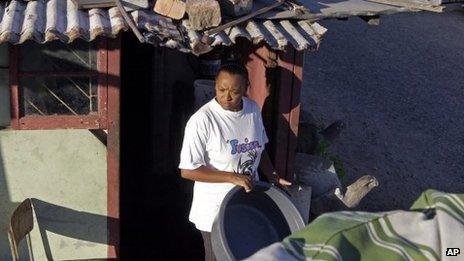South African unemployment: Lies and statistics
- Published
- comments

How to measure the number of unemployed people in South Africa?
It has become one of the defining truths about modern South Africa and its economic and social struggles: Soaring, endemic, potentially explosive levels of unemployment.
The official figures paint a resolutely grim picture , externalof a country where a quarter of the workforce cannot find a job, and where almost half of young South Africans are without work.
But are the figures accurate - or to borrow from Mark Twain - "damned lies"? , external
According to a report by labour analysts at a prominent South African company,, external the true unemployment figure here is actually about 11.3%.
Adcorp reaches this remarkable, and presumably contestable conclusion by including "informal sector jobs", which it concedes are hard to measure accurately.
South Africa's ruling alliance has always placed strong emphasis on the notion of "decent work", and some of the informal jobs - those beyond the reach of the tax inspector, unions, insurance etc - included in Adcorp's calculations presumably do not fall into that category.
But should they not be included in the overall employment figures regardless and what impact might they have on policy here if there were?
From what I have heard from analysts here, there is no suggestion that the books are being "cooked" for political purposes.
Administrative chaos is a more likely explanation.
Looking ahead, the key, presumably, is to find ways - taxation policy and labour law reforms being obvious ones - to lure more small businesses into the "formal sector", and to balance the urgent need to create more jobs with the need to ensure against exploitation and abuse.
Lurking behind these debatable unemployment statistics - and there is an interesting bit of fact-checking here , external - are the two undisputable and, perhaps, unsustainable facts of South Africa's economy: Too few people paying tax, and too many receiving welfare payments , external.
- Published24 October 2012

- Published3 October 2012

- Published29 August 2012

- Published9 July 2024

